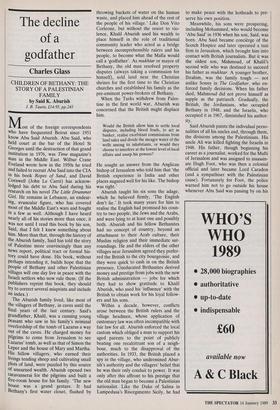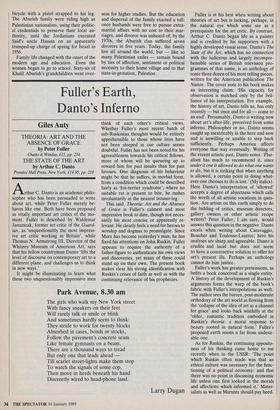The decline of a godfather
Charles Glass
CHILDREN OF BETHANY: THE STORY OF A PALESTINIAN FAMILY by Said K. Aburish I. B. Tauris, f14.95, pp.243 Most of the foreign correspondents who have frequented Beirut since 1951 know Abu Said Aburish. Abu Said, who held court at the bar of the Hotel St Georges until the destruction of that grand institution in 1976, was Time magazine's man in the Middle East. Wilbur Crane Eveland wrote how in the 1950s he tried and failed to recruit Abu Said into the CIA in his book Ropes of Sand, and David Cornwell (John Le Cane) has acknow- ledged his debt to Abu Said during his research on his novel The Little Drummer Girl. He remains in Lebanon, an endear- ing, avuncular figure, who has covered most of the Middle East's wars and fought in a few as well. Although I have heard nearly all of his stories more than once, it Was not until I read this book by his son, Said, that I felt I knew something about him. More than that, through the history of the Aburish family, Said has told the story of Palestine more convincingly than any news report, political tract or formal his- tory could have done. His book, without perhaps intending it, builds hope that the people of Bethany and other Palestinian villages will one day live in peace with the Israeli settlers who now rule them. (If the publishers reprint this book, they should try to correct several misprints and include an index.) The Aburish family lived, like most of the villagers of Bethany, in caves until the final years of the last century. Said's grandfather, Khalil, was a cunning young peasant who saw in his family's nominal overlordship of the tomb of Lazarus a way out of the caves. He charged money for pilgrims to come from Jerusalem to see Lazarus' tomb, as well as that of Simon the Leper and the house of Mary and Martha. His fellow villagers, who earned their livings tending sheep and cultivating small plots of land, were puzzled by this source of unearned wealth. Aburish opened two caravanserai for the pilgrims and built a five-room house for his family. `The new house was a grand gesture. It had Bethany's first water closet, flushed by throwing buckets of water on the human waste, and placed him ahead of the rest of the people of his village.' Like Don Vito Corleone, but without the resort to vio- lence, Khalil Aburish used his wealth to place himself in the role of traditional community leader who acted as a bridge between incomprehensible rulers and his people, to become what the Mafia would call a 'godfather'. As mukhtar or mayor of Bethany, the old man resolved property disputes (always taking a commission for himself), sold land near the Christian shrines for the first time to the Christian churches and established his family as the pre-eminent power-brokers of Bethany.
When the Turks withdrew from Pales- tine in the first world war, Aburish was concerned that the British might displace him.
Would the British allow him to settle local disputes, including blood feuds, to act as banker, realise exorbitant commissions from land sales and divide the meagre water of the wells among its inhabitants, or would they choose to interfere at the lowest level of local affairs and usurp his powers?
He sought an answer from the Anglican bishop of Jerusalem who told him that `the British experience in India and other places augured well for his like. The bishop was right.' Aburish taught his six sons the adage, which he believed firmly, `The English don't lie.' It took many years for him to realise the English had promised his coun- try to two people, the Jews and the Arabs, and were lying to at least one and possibly both. Aburish and his fellow Bethanites had no concept of country, beyond an attachment to their Arab culture, their Muslim religion and their immediate sur- roundings. He and the elders of the other villages near Jerusalem agreed they prefer- red the British to the city bourgeoisie, and they were quick to cash in on the British presence. Uneducated Bethanites derived money and prestige from jobs with the new British administration — jobs for which they had to show gratitude to Khalil Aburish, who used his 'influence' with the British to obtain work for his loyal follow- ers and his sons.
Within a decade, however, conflicts arose between the British rulers and the village headmen, whose application of customary law was often incompatible with fair law for all. Aburish enforced the local custom which obliged a man to support his aged parents to the point of publicly beating one recalcitrant son of a neigh- bour, much to the disapproval of the authorities. In 1933, the British placed a spy in the village, who undermined Abur- ish's authority and the villagers' belief that he was their only conduit to power. It was only after this affront to his prestige that the old man began to become a Palestinian nationalist. Like the Duke of Salina in Lampedusa's Risorgimento Sicily, he had to make peace with the hotheads to pre- serve his own position.
Meanwhile, his sons were prospering, including Mohammed, who would become `Abu Said' in 1936 when his son, Said, was born. Abu Said became concierge of the Scotch Hospice and later operated a taxi firm in Jerusalem, which brought him into contact with British journalists. But it was the oldest son, Mahmoud, of Khalil's second wife who was destined to succeed his father as mukhtar. A younger brother, Ibrahim, was the family tough — not unlike Sonny in The Godfather, who en- forced family decisions. When his father died, Mahmoud did not prove himself as supple as the patriarch. Gradually, the British, the Jordanians, who occupied Bethany in 1948, and the Israelis, who occupied it in 1967, diminished his author- ity.
Said Aburish paints the individual perso- nalities of all his uncles and, through them, the divisions among the Palestinians. His uncle Ali was killed fighting the Israelis in 1948. His father, though beginning his career as a journalist, worked for the Mufti of Jerusalem and was assigned to assassin- ate Hugh Foot, who was then a colonial official and later became Lord Caradon (and a sympathiser with the Palestinian cause). Fortunately for Foot, the police warned him not to go outside his house whenever Abu Said was passing by on his bicycle with a pistol strapped to his leg. The Aburish family were riding high as Palestinian nationalists, using their politic- al credentials to preserve their local au- thority, until the Jordanians executed Said's uncle Hassan on an apparently trumped-up charge of spying for Israel in 1956.
Family life changed with the onset of the modern age and education. Even the women began to go to school. Sixty-six of Khalil Aburish's grandchildren went over- seas for higher studies. But the education and dispersal of the family exacted a toll: once husbands were free to pursue extra- marital affairs with no cost to their mar- riages, and divorce was unheard of; by the 1970s, the Aburish clan suffered seven divorces in five years. Today, the family live all around the world, but — like so many Palestinian exiles — remain bound by ties of affection, sentiment or political necessity to their home village and to that state-in-gestation, Palestine.



















































 Previous page
Previous page